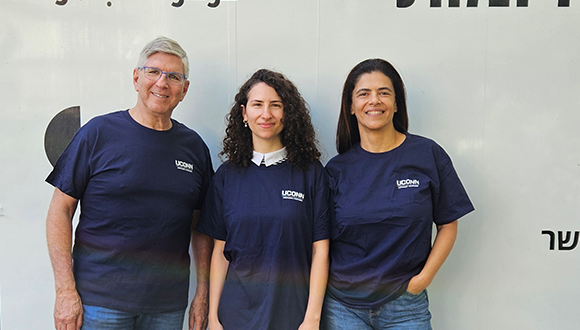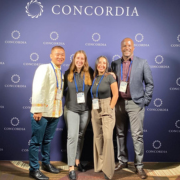‘Hackathon’ Led by Tel Aviv University and UConn Brings Together Students from Middle East, North Africa and the U.S.
Joint event fosters peacebuilding, dialogue and real-world problem solving
At a time when campuses across the world are grappling with polarization, dozens of students from the U.S., Israel, Palestine, Morocco, Bahrain and the United Arab Emirates gathered virtually for a recent two-day ‘hackathon’ of collaboration, innovation and inspiration.
The first-ever Abrahamic Hackathon was a pilot initiative of the Joseph I. Lieberman Abrahamic Innovation & Entrepreneurship Program in the University of Connecticut’s (UConn’s) Office of Global Affairs.
It drew 42 students to convene virtually on May 14 and 15, spending 27 hours working in mixed-nationality teams to brainstorm solutions to a common regional issue: household water consumption.
The hackathon’s success proved to be a quiet but powerful statement that academic collaboration across divides is not only still possible, but more vital than ever.
“The fact that we provide students with an opportunity to work with people from other geographies in the MENA [Middle East and North Africa] region—something they would otherwise never do—is a really meaningful way for academia to bring more unity, more tolerance and more familiarity between communities.”—Yair Sakov, Founder and Managing Director of Tel Aviv University’s (TAU’s) Entrepreneurship Center, which helped to lead the initiative.
The event was organized in partnership with the UConn’s Abrahamic Programs under the Office of Global Affairs. The Lieberman program, named for the late Senator Joseph I. Lieberman, is part of the initiative and supports peaceful coexistence and regional integration through innovation and entrepreneurship.
“We are delighted with the positive results of this inaugural hackathon. The participants were deeply engaged with each other and demonstrated the beauty of pursuing a new politics of respect and cooperation in the region,” says UConn Vice President for Global Affairs Daniel Weiner. “And, we are very grateful to the TAU Entrepreneurship Center.”
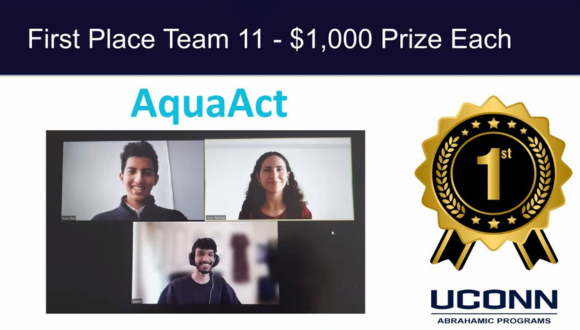
The first-place winners, winning $1,000 each, were Anas Elkhabbaz, Linor Neiman and Aasim Choudhry.
In addition to student hackathons, UConn Abrahamic Programs include collaborative curriculum development with its partners, including a shared online course; experiential study-abroad programs; and a MENA region Abrahamic hub. It also includes support for small and medium enterprises (SMEs), as well as virtual and on-site workshops.
“This inaugural hackathon bringing together bright young entrepreneurial minds from the MENA region and the U.S. reminded us once again that the Abrahamic programs plant seeds of peace and help us celebrate our common humanity while many college campuses around the world are drowning in the politics of difference.”—Sercan Canbolat, Director of UConn Abrahamic Programs.
UConn’s Abrahamic Programs initiative was established in 2016, four years before the Abraham Accords.
It serves as an academic umbrella fostering cross-border research collaboration, intercultural communication and community engagement to explore emerging trends and issues of critical importance in the MENA region.
From Planning in Connecticut to Teamwork on Zoom
According to Sakov, the idea for the hackathon began during a 2024 planning workshop in Stamford, Connecticut, and included a week spent with representatives from across the region.
“The hackathon was the first project we chose to pursue, to see how the students responded to the opportunity to work with students from the other countries.”—Yair Sakov.
In addition to UConn and TAU as core institutional partners for the hackathon, the other participating institutions were Ben-Gurion University of the Negev; EcoPeace Middle East Palestine Office; INTERMID in Bahrain; the International University of Rabat (UIR) in Morocco; SP Jain School of Global Management in the United Arab Emirates (UAE); and The Dealmakers, formerly known as the Abrahamic Business Circle, in the UAE.
Hackathon participants were placed in 12 mixed-nationality teams and challenged to work together to propose solutions to the issue of household water consumption and waste.
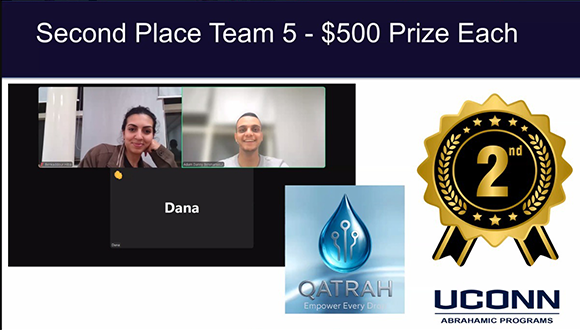
The second-place winners, winning $500 each, were Adam Danny Benmansour, Dana Salman and Yash Ippakayal.
In addition to 42 participants, 12 mentors and seven judges from the MENA region and the US partook in the hackathon. Mentors and staff met individually with the teams in breakout rooms, and the event also offered group activity sessions for all participants.
“It’s not that simple to have a hackathon with 63 people, among them students, mentors and staff, working together for 27 hours, everything well-orchestrated, people going in and out of Zoom rooms,” reflected Eti Finkelstein, Programs Manager at TAU Entrepreneurship Center, whose expertise helped to put the various hackathon pieces together.
Winning Ideas, Lasting Impact
The winning team—Anas Elkhabbaz from Morocco, Aasim Choudry from Bahrain and Linor Neiman from Israel—proposed a cost-effective solution that built on existing infrastructure.
“A lot of the students proposed installing new sensors, new equipment … which can be expensive and challenging to install,” Sakov said.
“But the winning team realized there are already quite a few homes in the region that have all kinds of sensors measuring water consumption. Instead, they decided to build on the existing infrastructure and have an avatar that talks to you in a very personalized manner, alerting you when water is used efficiently or wasted.”—Yair Sakov
Helping those brilliant young minds refine their products and perfect their pitch brought me immense joy as a mentor. Witnessing youth from different countries and backgrounds working hard together was a powerful sign of a future built on understanding and collaboration,” says Amine Saihi, Lecturer at UIR Rabat Business School and one of the mentors of the hackathon.
For many of the other participants, the success of the event went far beyond the hacks proposed.
“By the end of it, I felt like I had achieved an even cooler goal. I walked away with new friends—my teammate from Bahrain and my teammate from Morocco.”—Linor Neiman, a TAU student from the winning team
Sakov reinforced how critical it is to offer such opportunities to students in the MENA region.
“If you want to take communities that typically don’t talk to each other and bring them together, the best way is to give them a joint goal—and institutional support that says: it’s okay to do this,” Sakov said.
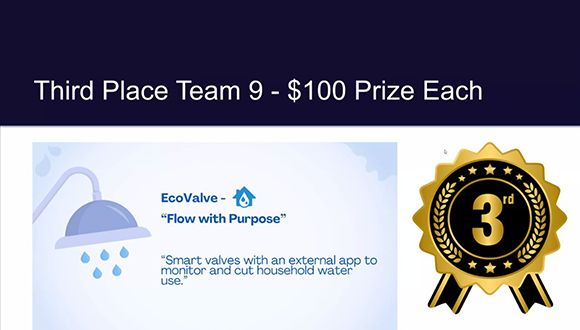
The third-place winners, winning $100 each, were Imane Enneya, Sana Abu Salem, Mohammed Isaamuddin and Samarth Dhupar.
TAU played a pivotal role in turning the vision into reality. “If it weren’t for us, this initiative wouldn’t have happened,” Sakov said. “Dan Weiner had the vision and the funding. But the execution—building the hackathon from scratch—was our job.”
The momentum is continuing. A six-week course titled Entrepreneurship Through Abrahamic Lands launched on May 20, bringing together 70 students, including eight TAU students, from across the MENA region for collaborative learning and project work.
Plans are also underway for a larger in-person hackathon and a regional summer program next year.
“Universities are a place where young people meet, interact, investigate and examine new concepts and new ideas in a very open-minded way,” Sakov said. “[Programs like this one] are a great way for us to leverage academia to bring more unity, to bring more tolerance and to get different communities familiarized with one another through talking.”
Find Out More
- Learn more about the University of Connecticut’s Abrahamic Programs.
- Learn more about TAU’s Entrepreneurship Center.

